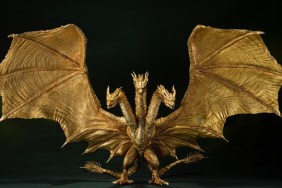
Our final interview of the day was with the God of Mischief, Tom Hiddleston’s Loki. Though not decked out in his comic book horned helmet for this particular scene, Hiddleston promised that it will get some screentime.
Originally auditioning for the part of Thor, Hiddleston found himself much more at home with the dynamic villain. Thor’s half-brother, Loki begins the film at the side of the band of warriors but obviously winds up showing his true colors as the story progresses.
“Craig [Kyle] tells a story that actually I was always going for Loki,” he smiled, “it’s just that I didn’t know that. Ken had intimated that he was looking for someone for Thor that was beginning to emerge on the page. He was looking for someone with a raw and physical intensity. That the actor playing Thor had to have a physical instinct that was immediately present and readable and that he knew I could do that but it wasn’t the first thing that came to mind.”
The primary motivator for Loki is jealousy of his older brother. Because Thor is the elder child, he’s the next in line to become the King and Loki is left with a sort of freedom to do what he wants.
“[T]hey’re both enormously gifted,” Hiddleston explained, “Thor and Loki are a two-man team and they’re both going to run Asgard when Odin steps down. Thor has an ability and a physicality and a presence—a physical presence that is…he’s the type of man you follow… You know, leaders were born and Thor is that guy. And Loki’s gifts are different in that he is sharper, he’s cleverer, he’s more interested in tactics and strategy. He’s capable of thinking ahead and he enjoys chaos. So he enjoys reacting to chaos and that affects how given that he’s the God of Mischief. Mischief is essentially chaos.”
Finding the physicalization of Loki became a task for Hiddleston to separate him from the character’s brother. Where Thor steps up with raw power, Loki enters with speed and agility.
“I conceived of Loki as a kind martial artist with these throwing knives,” said Hiddleston, “Someone who’s like a dancer. He dances his way out of combat and these knives are his way of keeping his foes at arm’s length, but they’re lethal. When you get one of those knives in, you’re gone.”
Of course, the famous Loki helmet also represented a fun element for Hiddleston to play with on-set.
“The horns are amazing,” he laughed, “It was the last thing I got to try on when I did the costume fittings and for me it was the most important thing because I read all the comics. I read right the way through the history of [Thor]… [The horns are] like Spider-Man’s suit. Loki isn’t Loki without those horns on. Initially we were fitted and it was kind of a conversation as to how much it covers his face. How much does he use them as like a weapon or is it just a statement of intent? It’s like a representation of his soul in some way. Like, ‘back off, because I’m dangerous.’”
The inward elements of Loki then become about finding subtlety for the character, letting the audience see the intangible seeds of Loki’s betrayal before they happen on-screen.
“I’ve talked to [Branagh] very much about subtlety, because I don’t want to do any eyebrow twitching or mustache twiddling. I don’t want to do sort of like a caricatured villain. I’ve tried very much to make Loki psychologically plausible. Someone who’s damaged and very, very intelligent and is able to sow the seeds of deceit. Like he’s the Oscar-winning liar, you know? He’d stand up there and you buy it. You’d buy anything from him. He’s the perfect salesman. Because my background is Shakespeare as well, I’ve done a lot of Shakespeare in London and Yargo is kind of a touch stone for me. Edmund in King Lear, if you know that story. But I draw my inspiration from all over the place. I’ve been listening to lots of the Prodigy. Like there was an album they released in the ‘90’s called Music for the Jilted Generation, which has a real rage in it. It has a real kind of, “Don’t piss me off, because I’ll bark at you.”
Hiddleston, who worked with Branagh before on Ivanov and Wallander, also took the director’s advice and studied two classic Peter O’Toole performances to build Loki upon.
“[I]n Lawrence of Arabia or The Lion in Winter, he is on the edge of darkness. He’s on the edge of sanity. You can see it in his eyes that he’s been pushed to the brink and you’re not sure if you can trust him because there’s a madness in there, you know? A greatness, too and a charisma and a power that you want to get close to and you want to see inside, but it’s a little bit dangerous… I drive to work every morning and I try and light some kind of bonfire under myself which is adrenaline’d and hot and alone. It’s a strange feeling when you’re playing a character that feels so alone.”
As for future appearance by Loki (the character of whom is responsible, in the comics, for the formation of The Avengers), Hiddleston was unsure. Whether that means that he didn’t know or was just keeping it under wraps is hard to say when you’re dealing with the God of Lies.



